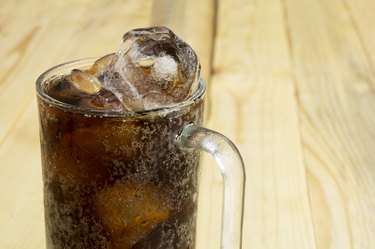
Concerns over the potential cancer-causing effects of artificial sweeteners have prompted ongoing research regarding their safety for human consumption. Sucralose is one type of widely used artificial sweetener that has a number of advantages over real sugar, which include a lack of calories and a greater sweetening power. While the safety of sucralose has been called into question by some, the majority of scientific evidence shows sucralose to be a safe substance that does not cause cancer.
Sucralose Background
Video of the Day
Sucralose is commonly used in low-calorie desserts and as a sweetening agent for beverages such as coffee and tea. Sucralose is the only artificial sweetener made from real sugar molecules. Scientists found that by substituting one part of a sugar molecule with chlorine, a substance 600 times sweeter than sugar was created. In addition to its intense sweetening power, sucralose is a calorie-free food since it's not efficiently absorbed by the body.
Video of the Day
Safety Studies
Concerns about a possible link between artificial sweeteners and cancer first arose when two other artificial sweeteners, cyclamate and saccharin, were found to cause bladder cancer in animals when used together. The National Cancer Institute notes, however, that there is no evidence that any artificial sweeteners approved by the U.S. Food and Drug Administration cause cancer in humans. Before sucralose was approved for use by the FDA, more than 100 safety studies were reviewed to determine if there was a link between the artificial sweetener and cancer. The evidence showed that sucralose does not pose any risk to human health.
Animal Evidence
While there are no human studies linking sucralose to cancer, an independent laboratory study conducted in 2013, which has yet to be published, found a possible link between the artificial sweetener and leukemia in mice. While the Center for Science in the Public Interest had previously assigned rating of "Safe" to sucralose, the study prompted the group to change its rating to "Avoid," at least until the study can be further evaluated. The center's executive director, Michael F. Jacobson, notes, however, that sucralose may be safer than other artificial sweeteners, including saccharin, aspartame and acesulfame potassium, which all have a rating of "Avoid."
The Large Majority
Even with one study demonstrating a potential link between sucralose and cancer in animals, the overwhelming majority of scientific evidence has shown the sweetener to be safe. New York University Langone Medical Center notes that sucralose was intensely scrutinized for more than 20 years by a various regulatory agencies before being approved for use. At this time, it can be safely said that there is no known link between sucralose and cancer in humans.